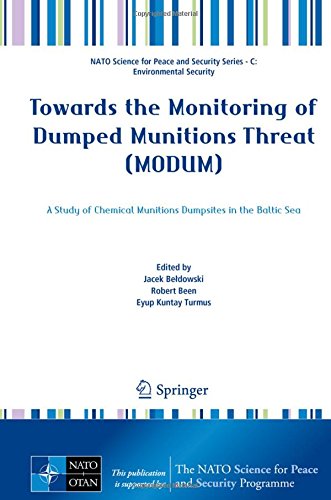

Most ebook files are in PDF format, so you can easily read them using various software such as Foxit Reader or directly on the Google Chrome browser.
Some ebook files are released by publishers in other formats such as .awz, .mobi, .epub, .fb2, etc. You may need to install specific software to read these formats on mobile/PC, such as Calibre.
Please read the tutorial at this link: https://ebookbell.com/faq
We offer FREE conversion to the popular formats you request; however, this may take some time. Therefore, right after payment, please email us, and we will try to provide the service as quickly as possible.
For some exceptional file formats or broken links (if any), please refrain from opening any disputes. Instead, email us first, and we will try to assist within a maximum of 6 hours.
EbookBell Team

0.0
0 reviewsThis book describes the creation of a monitoring network, which can provide information about the exact locations and the environmental threats posed by chemical weapons (CW) dumpsites in the Baltic Sea region, using autonomous underwater vehicles (AUVs) and remotely operated underwater vehicles (ROVs), and utilising the existing research vessels of NATO partner institutions as launching platforms.
The dumping operations occurred shortly after World War II and included captured German munitions. Operations with munitions from the Soviet occupation zone were performed by the Soviet Navy, operations with munitions from British and American occupation zones were performed in areas outside of the Baltic Sea (Skagerrak Strait); the fate of munitions from the French occupation zone was never reported. Due to difficult legal status of these munitions, and high costs of remediation and retrieval, removal of these weapons from the bottom of the Baltic Sea seems unlikely in the foreseeable future. These dumped chemical weapons pose an actual environmental and security hazard in the Baltic Sea Region. Nowadays, with more and more industrial activities being performed in the Baltic Sea Area, the threat level is rising.
The AUV survey is based on the IVER2 platform by OceanServer, equipped with Klein 3500 side-scan sonar. The identification phase utilises several ROVs, equipped with targeting sonars, acoustic cameras capable of penetrating turbid bottom waters up to 20m, and visual HD cameras. A novel sediment sampling system, based on a camera and sonar equipped cassette sampler, has been developed to obtain surface sediments. The test phase described consists of a survey phase, which will locate the actual objects concerned, and a monitoring phase, which will concentrate on the collection of environmental data close to the objects concerned.